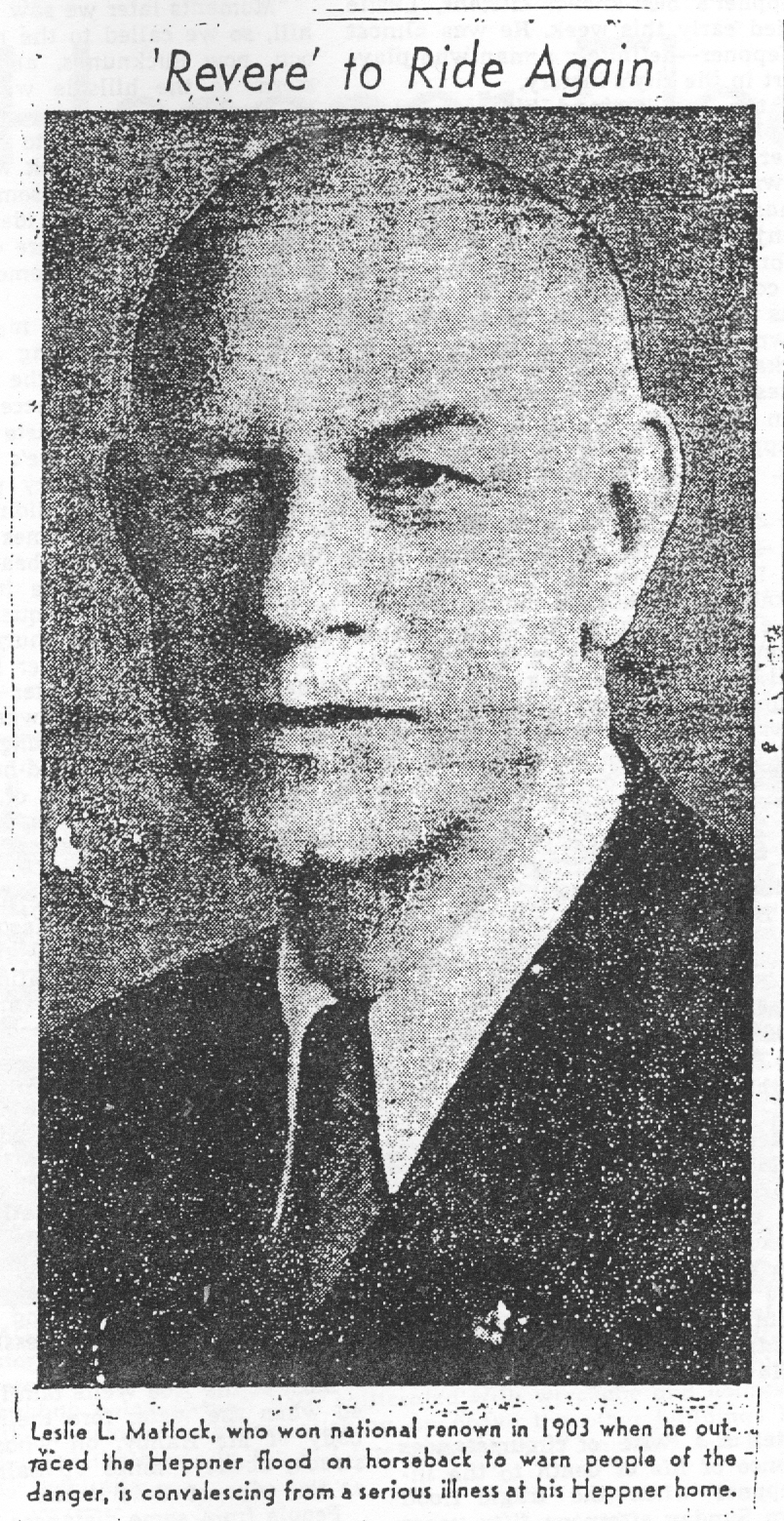
- Leslie Matlock was a cousin to my father Willard W. Keeney by marriage of Elias Keeney's
son James Maynard to Elizabeth Matlock, daughter of Thomas Matlock. Anna Isabella Cooper was a
stepdaughter of Andrew Jackson Keeney. She married J.W. Matlock. Thomas J. Matlock married Mary E.
Larkins, nee Keeney. She was the daughter of Eli and Elizabeth Keeney. Mary E. Matlock
was drowned in the Heppner Flood of 1903.
One of Heppner's best-known citizens, Leslie L. Matlock, died early this week. He was almost a legend in Heppner--definitely a man who played a great part in the city's history.
Because of the part he and his late friend Bruce Kelley played in the often retold accounts of the Heppner flood of 1903. Les Probably had more stories written about him than any other pereson who has ever lived in Heppner. He was a man who enjoyed his full life, all 84 years of it. He never bragged about his ride to Ione to warn of the coming flood, in fact, he ducked most questions about it and in later years he was best known for his love of a deck of cards and his remarkable ability to recite many of the works of Shakespeare. He loved fine clothes and even as a man well over 80 he shared with no resident of Heppner the title of the city's best-dressed citizen. He place on Main street won't filled.
Many many things could be said about Les Matlock in an editorial for he was one of the few remaining links between Heppner of today and its remarkable past--he has played a part in both--but we feel that the most appropriate obituary this newspaper could give to any man is to gain tell the "old" story as it was told to us by Les himself and printed in the Gazette Times in the special Heppner Flood Commemoration Edition of June 11, 1953 on the 50th anniversary of that great tragedy. His own story is reprinted in its entirety:
THE MATLOCK STORY
- "We Did Nothing That Somebody Else Couldn't Have Done"
No recording of the events during the time of the Heppner flood would be complete without Leslie Matlock's own story of the happenings on that Sunday and of the will-known ride that he and Bruce Kelly made down Willow Creek to warn the residents of Lexington and Ione of the water.
Numerous writers, some of them quite well known, have told and retold the story many times and Matlock tells it again here. It took persuasion to get him to give it for he has indicated on more than one occasion that all the publicity is rather embarrassing. He strongly emphasizes that "We weren't tryong to do anything smart, and we did nothing that somebody else couldn't and wouldn't have done under the same circumstances." He and Kelly just happened to think of it first.
A matter minutes or a twist of circumstances meant that difference of life or death to the inhabitants of Heppner when the tragic flood swamped the town Sunday afternoon fifty years ago, according to Leslie L Matlock, who with his friend, Bruce Kelly, rode their horses over the hills to Lexington and Ione hoping to avert further loss of life that happpened there.
In the afternoon, Matlock recalled that he returned to his room at the Palace hotel after having dinner with Dr McSword at his home of his uncle, T J Matlock. After a call to the Abe Wells home. Dr McSword and John Ayers later went to the George Conser home, which circumstance marked their fate.
Matlock dozed off in the murky extreme heat and was later awakened by claps of thunder. Going through the hall he reassured the worried waitresses that the storm would be harmless, and went out on the street where he stood with a young cigar maker watching the rain.
"Moments later he saw women running for the hill, so we called to the men in Swaggert's Saloon, now Buckmum's, and all fled through the storm to the hillside watching the destruction in horror."
"Bruce Kelley said to me." Matlock recalled, "Everyone on this creek will be drowned." I replied that "If we get some horses we can beat it down the creek." The idea took hold and Kelley said, "You get some wire cutters at Gilliam and Bisbee's and I'll get some horses at the livery stable."
Orve Rasmus helped me break in to get the wooden handled pruning shears we found and then we took off over the hill behind the bank, cutting fenses where necessary. Kelley got his own horse but in the haste and excitement grabed for me someone else's horse which I changed at the Frank Rainely place a mile or two below Lexington. We didn't talk much, except to call warnings at homes along the way. The flood water had already beat us to Lexington, but we felt we could make it to Ione before the water hit there. No one questioned our story and everyone along the way hurried to higher ground.
Though the flood water had subsided by the time it reached Ione, after the arrival of Kelley and Matlock, the townspeople showed their gradtitude to the two young men by presenting each of them with a gold-headed cane inscribed "Presented by the people of Ione in grateful rememberance of the heroic ride during the flood at Heppner, June 14, 1903." This is still a proud possession of Mr Matlock.
After remaining at Ione for a part of the night, Kelley, Matlock, Bert Mason and others rode back to Heppner, arriving about daylight. Amid the destructiion and desolation they learned that the worst had happened and those who were left join in recovering bodies.
"My friends, John Ayers and Dr McSword ran out of the Conser home when the water struck and were drowned. Mr and Mrs Conser themselves ran upstairs, which saved their lives, as the house remained intact as it was swept down-stream to the Methodist church with a section of sidewalk through it." Matlock said.
Among other victims was Mr Matlock's uncle, J W Matlock, who was pulled from an upstairs porch along with his son, Lee. The young man had thrown off his coat and managed to get to safety after trying unsuccessfully to rescue his father.
Most of the Abe Wells family, too, were drowned when the water tore their house apart. The body of Mr Hanby, on whose farm the flood struck, about 7 miles up Balm fork, was found at the edge of Gale street.
People from some distances observed the flood cloud that day, Matlock said. A fellow named Pole Thompson, living five or six miles below Cecil, remarked to two cowboy compainions that when that cloud broke there would be more water in Willow creek than had ever been seen in it before. Ben Swaggart, some 12 miles from Heppner on Swaggart Buttes, also saw the black ominous cloud.
The next day, Guy Boyer, then a lad living up Hinton creek, was sent on horseback to Echo where he took the train to Pendleton to announce the fate of Heppner. At the news, people, teams and horses came from Pendleton in record times and on dead runs to bring help to us.
(This story, with its editor's note lead in black face type, appeared in the June 11, 1953 Heppner Gazette-Times as it was told by Leslie Matlock.)
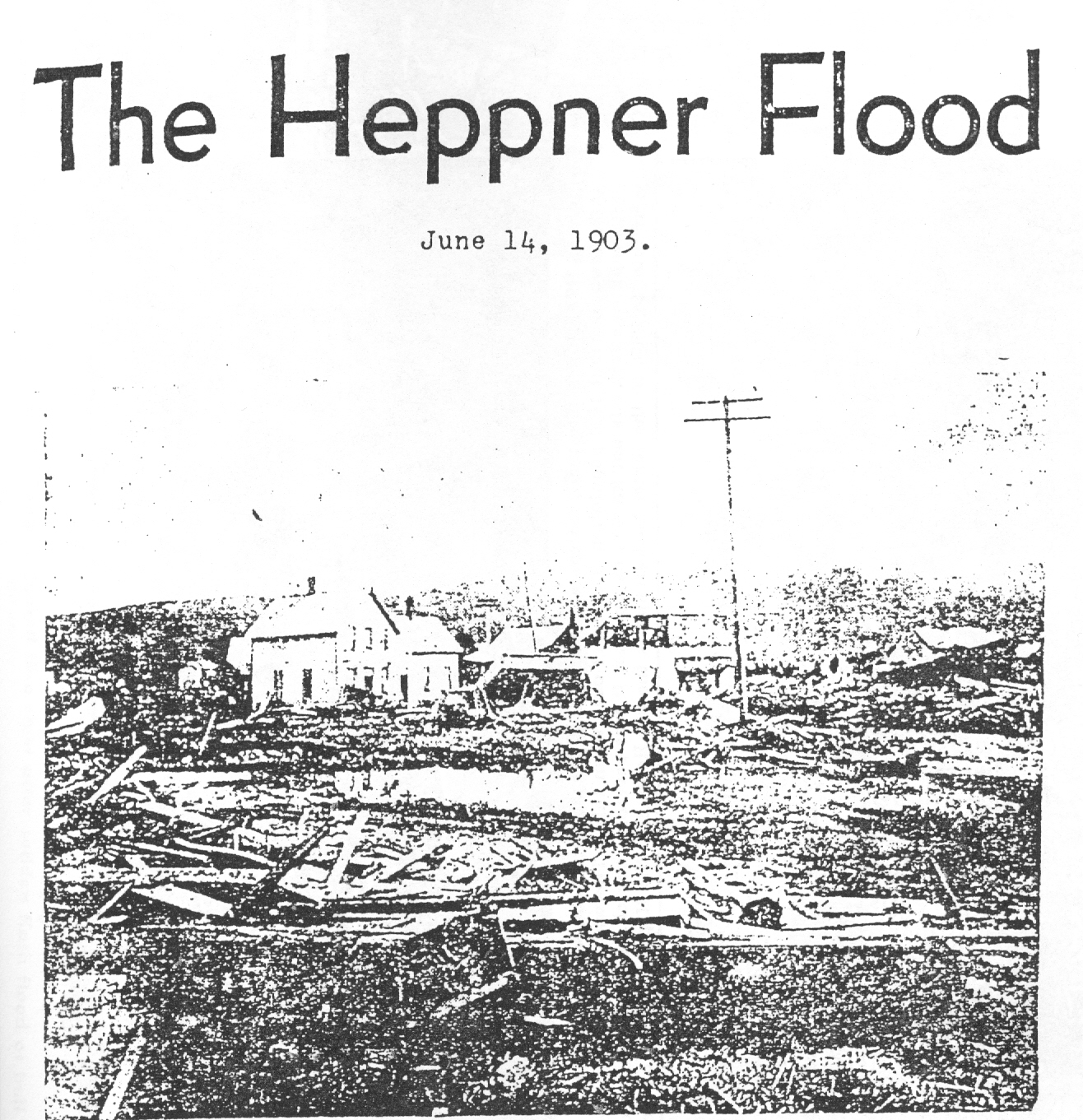
- BOARDS AND WRECKAGE SCATTERED EVERYWARE. This cut shews the pile of rubble that were left
after the waters had taken the lives of at least 251 of he residents of Heppner. It is thought
that this picture was taken looking north on north Gale street which probably was marked by
the row of telephone poles, though here obliterated with wreckage and houses. The top of
the steeple of the Methedist church is shown sticking up above the other buildings between the
first two poles. It is thought the house in the left foreground is still standing but just
where and to whom it belongs is indefinite.
For more details and better photos, see America's deadliesst natural flash flood happened in Heppner and the 'Heppner Flood of 1903' link on the noaa.gov website. Also, see photos by Walter S. Bowman in 1903, University of Oregon Library. Wikipedia, Heppner Flood of 1903.
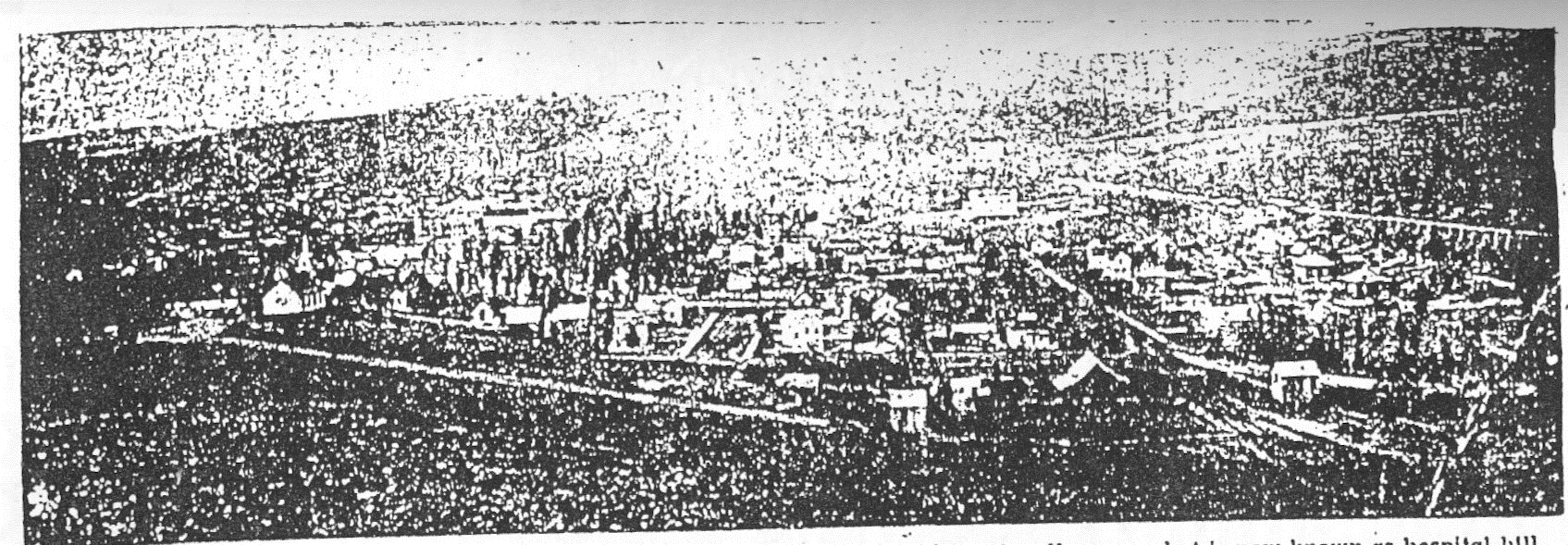
- THIS WAS HEPPNER before the flood came to wipe out a big part of the town of about 1400 population.
The exact date when this photograph was taken is not known, except that it was several years prior to 1903.
Inthe center background is the old Heppner school, which sat well up on what is now known as hospital hill.
The white building in the left forground was then the Catholic church. It still stands, and has since been
remodeled and is now the Heppner American Legion hall.
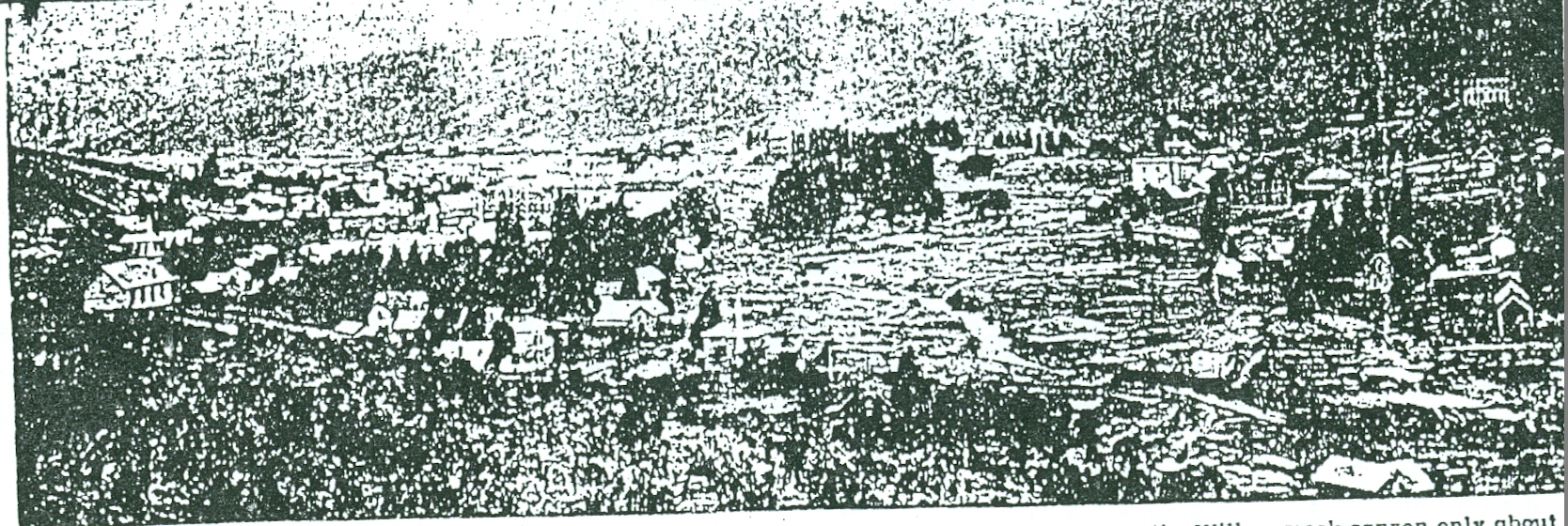
- WHEN THE WATER HAD TAKEN ITS TOLL This was the way the south end of the town looked. This picture
was taken from approximately the same position on cemetery hill as the above photo. It was in this
upper section, where the valley is very narrow, that the water hit first. The torrent came into
Heppner from Balm fork which enters the Willow creek from the lower right corner of this picture.
As can be seen, this section was swept clean of buildings and trees.
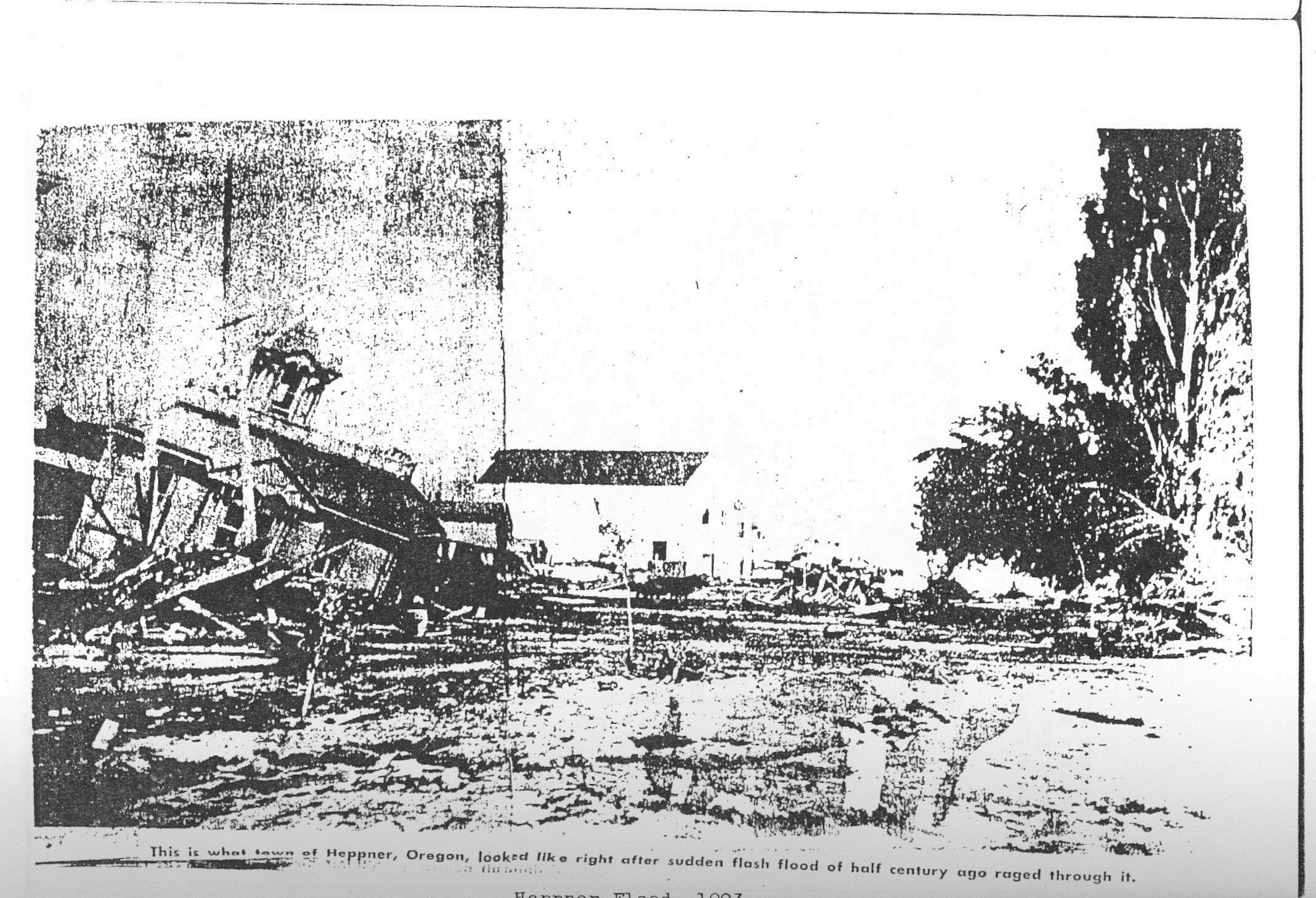
- Heppner Flood - 1903. This is what the town of Heppner, Oregon, Looked like right after sudden
flash flood of half century ago raged through it.
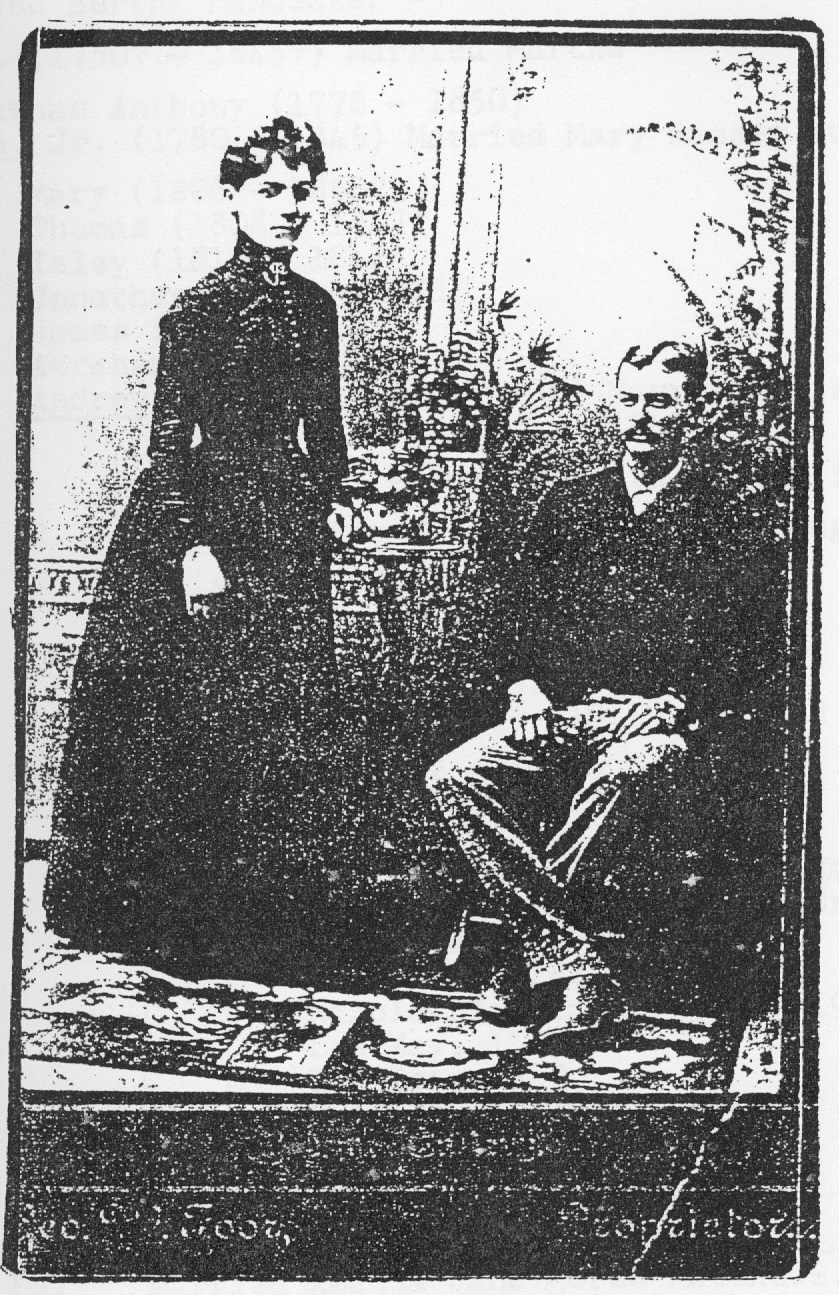
- Lane Matlock and Wife. Lane Matlock was one of the boys who plaed, as a youth, on the
Keeney Farm near Goshen, Oregon. He is mentioned in Thomas Keeney's story; "A Boy On The Keeney Farm."
The Keeneys and Matlocks were cousins.